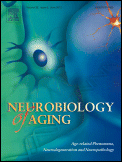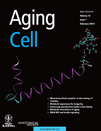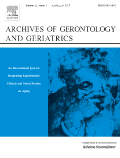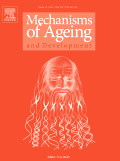
Nature Aging
Scope & Guideline
Unraveling the Complexities of Aging
Introduction
Aims and Scopes
- Molecular Mechanisms of Aging:
Research exploring the cellular and molecular processes that drive aging, including studies on epigenetics, mitochondrial function, and cellular senescence. - Age-Related Diseases:
Investigation of diseases commonly associated with aging, such as Alzheimer's disease, cardiovascular diseases, and metabolic disorders, focusing on their pathophysiology and potential therapeutic interventions. - Biomarkers of Aging:
Development and validation of biomarkers that can predict biological age, healthspan, and the onset of age-related diseases, utilizing omics technologies and machine learning approaches. - Public Health and Aging:
Studies addressing the social determinants of health in aging populations, including health disparities, access to healthcare, and the impact of lifestyle factors on aging. - Interventions for Healthy Aging:
Research on lifestyle interventions, pharmacological treatments, and innovative therapies aimed at promoting healthy aging and longevity. - Technological Innovations in Aging Research:
Exploration of the role of technology, including artificial intelligence and machine learning, in aging research, diagnostics, and therapeutic strategies.
Trending and Emerging
- Epigenetic Mechanisms in Aging:
There is a growing focus on the role of epigenetics in aging, including studies on DNA methylation and histone modifications, which are crucial for understanding how environmental factors influence aging. - Inflammaging and Immune Senescence:
Research into the relationship between chronic inflammation and aging, particularly how immune system changes contribute to age-related diseases, is becoming increasingly prominent. - Microbiome and Aging:
The exploration of the gut microbiome's role in aging and its impact on healthspan and disease susceptibility is gaining traction, linking diet, microbiota, and longevity. - Technological Integration in Aging Research:
The application of artificial intelligence and machine learning to analyze aging data and predict health outcomes is a rapidly growing area of interest, enhancing the precision of aging research. - Social Determinants and Health Equity in Aging:
An emerging emphasis on understanding how social factors and health disparities affect aging outcomes is reflected in recent studies, highlighting the need for equitable aging policies.
Declining or Waning
- Traditional Gerontology:
Research focusing solely on demographic studies and social gerontology aspects appears to be waning, as the journal shifts towards more integrative and mechanistic studies of aging. - Simple Descriptive Studies:
There is a noticeable reduction in purely descriptive studies that do not employ advanced methodologies or novel insights, indicating a trend towards more complex experimental designs. - Animal Models in Isolation:
While animal studies remain important, the focus on traditional models without translational relevance to human aging seems to be decreasing in favor of studies that bridge basic biology with clinical implications. - Aging as a Uniform Process:
The perception of aging as a monolithic process is declining, with more emphasis now placed on heterogeneity in aging trajectories across individuals and populations.
Similar Journals

BIOGERONTOLOGY
Illuminating the Path to Healthy AgingBIOGERONTOLOGY, published by SPRINGER, is a premier journal dedicated to the interdisciplinary study of biological aging processes and their implications for health and longevity. With an ISSN of 1389-5729 and an E-ISSN of 1573-6768, this journal features cutting-edge research that addresses critical questions in the fields of aging, geriatrics, and gerontology. Ranking impressively in the top quartiles, particularly as Q1 in Gerontology, BIOGERONTOLOGY is recognized for its contributions to advancing the understanding of aging at both molecular and systemic levels. The journal’s rich repository of scholarly articles provides valuable insights for researchers, healthcare professionals, and students alike, fostering a deeper comprehension of age-related biological mechanisms. Although not an open-access journal, it is highly regarded with an impact factor that reflects its significant role in the academic community. The journal spans from 2000 to 2024, ensuring a broad historical context for its studies, and is based in the Netherlands, with its administrative office located at One New York Plaza, Suite 4600, New York, NY 10004, United States. Engaging with BIOGERONTOLOGY means joining a global dialogue on the science of aging and the implications it holds for humanity.

NEUROBIOLOGY OF AGING
Advancing Knowledge in Neurobiology and AgingNEUROBIOLOGY OF AGING, published by Elsevier Science Inc, is a premier journal dedicated to advancing our understanding of the complex interactions between the aging process and neurobiological mechanisms. With an ISSN of 0197-4580 and E-ISSN 1558-1497, the journal has established itself as a critical resource in the fields of Aging, Developmental Biology, Geriatrics and Gerontology, Clinical Neurology, and Neuroscience. Boasting a Q1 ranking in multiple categories, the journal is positioned within the top echelons of scholarly publication, underscoring its significant impact with an impressive Scopus ranking in various subfields. Committed to disseminating high-quality, peer-reviewed research, NEUROBIOLOGY OF AGING welcomes original articles, reviews, and research notes aiming to uncover the underlying processes of aging on the nervous system, fostering collaboration among researchers, professionals, and students alike. Although primarily subscription-based, the journal continues to play a vital role in shaping the discourse on aging and neurobiology, making it an essential publication for those engaged in this dynamic field.

GeroScience
Pioneering Discoveries in Geriatric HealthGeroScience, published by Springer, is an esteemed open-access journal that focuses on the multidisciplinary field of aging research. Since its inception in 2017, the journal has quickly established itself as a leader in its field, achieving impressive Q1 quartile rankings across various categories, including Aging, Cardiology and Cardiovascular Medicine, Geriatrics and Gerontology, and Complementary and Alternative Medicine, as per 2023 evaluations. With a significant impact factor that underscores its influence and reach in academia, GeroScience aims to disseminate high-quality research that addresses the complex challenges and advancements related to aging. Its accessible publication format fosters greater dissemination of knowledge and encourages collaboration among researchers, practitioners, and students eager to contribute to the growing body of work on age-related health issues. As it continues to thrive, GeroScience remains a pivotal resource for anyone looking to stay at the forefront of aging research.

AGING CELL
Unlocking the Secrets of Aging at the Cellular LevelAGING CELL is a premier peer-reviewed journal published by Wiley, specializing in the rapidly evolving field of aging research and cell biology. Established in 2002 and enjoying an impressive track record as evidenced by its Q1 ranking in both Aging and Cell Biology categories for 2023, the journal has become a vital resource for researchers and professionals alike. With a significant impact factor highlighting its scholarly influence, AGING CELL offers an open access model since 2014, ensuring that groundbreaking research is accessible to the global community. The journal covers a wide array of topics related to the mechanisms of aging at the cellular and molecular levels, making it essential reading for anyone invested in understanding the complexities of aging processes and their implications for health and disease. With a broad international readership based in the United Kingdom and beyond, AGING CELL is dedicated to disseminating high-quality research that impacts scientific understanding and fosters advances in the field.

Aging Brain
Illuminating the Path to Cognitive LongevityAging Brain is a premier Open Access journal published by Elsevier, dedicated to advancing the understanding of the neurobiological changes associated with aging. Since its commencement in 2021, this journal has been pivotal in disseminating high-quality research that explores the intricate relationships between aging and cognitive functions, neurological disorders, and overall brain health. With a notable commitment to open accessibility, Aging Brain ensures that vital findings are available to a global audience, fostering collaboration and innovation in the field. Researchers, healthcare professionals, and students alike will find a rich repository of cutting-edge studies, reviews, and insights aimed at addressing the complexities of the aging brain. The journal stands as an influential platform for those passionate about enhancing the quality of life for the aging population, making it a valuable resource in gerontology and neuroscience.

Advances in Gerontology
Exploring the Future of Aging ResearchAdvances in Gerontology is a pivotal academic journal dedicated to the field of gerontology, published by PLEIADES PUBLISHING INC. With its ISSN 2079-0570 and E-ISSN 2079-0589, this journal serves as an essential platform for researchers, healthcare professionals, and students focused on aging and related health issues. Although currently not an open-access journal, it aspires to enrich the scholarly community by disseminating high-quality research from 2011 through 2024. The journal is recognized in the lower quartile of its category, ranking Q4 in both Geriatrics and Gerontology, reflecting its commitment to addressing emerging topics in the aging population despite its lower visibility in the competitive landscape. As it continues to explore critical areas in gerontology, Advances in Gerontology invites contributions that advance knowledge, foster understanding, and inform practices within this essential field of study.

ARCHIVES OF GERONTOLOGY AND GERIATRICS
Empowering research for a healthier aging society.The Archives of Gerontology and Geriatrics, published by Elsevier Ireland Ltd, is a leading journal in the fields of Aging and Geriatrics and Gerontology. With an ISSN of 0167-4943 and an E-ISSN of 1872-6976, it has established itself as a crucial platform for disseminating high-quality research focused on the biological and psychosocial aspects of aging. The journal holds an impressive Q2 ranking in both Aging and Geriatrics and Gerontology, and a Q1 ranking in Gerontology and Health (Social Science) as of 2023, reflecting its significant impact in these disciplines. Additionally, the journal is ranked #33/371 in Social Sciences (Health) and #5/39 in Nursing (Gerontology) according to Scopus, showcasing its esteemed position in the academic community. Although currently not open access, the journal offers a wealth of research articles from 1982 to the upcoming 2025 that are vital for stakeholders including researchers, healthcare professionals, and students aiming to advance their understanding of aging processes and policies. Titles published within its pages contribute to shaping agendas in public health and gerontological practice, making it an essential resource for those involved in the study of the elderly population.

GERONTOLOGY
Navigating the Complexities of Later LifeGERONTOLOGY, published by KARGER in Switzerland, is a prominent journal dedicated to the study and understanding of aging, with a keen focus on the interdisciplinary aspects of geriatric medicine and gerontology. Established in 1957, it has provided a platform for cutting-edge research that covers a wide range of topics including, but not limited to, the biological, psychological, and sociological aspects of aging. With an impressive ranking that places it in the Q3 category for Aging and Q2 for Geriatrics and Gerontology as of 2023, the journal continues to attract high-quality submissions from researchers worldwide, evidenced by its Scopus rankings, which position it favorably within relevant fields. While it operates under a subscription model, the journal remains committed to advancing knowledge that informs practice and policy within an aging society. By fostering innovative studies and discussions, GERONTOLOGY serves as an essential resource for researchers, health professionals, and students alike, dedicated to the care and understanding of older adults.

JOURNALS OF GERONTOLOGY SERIES A-BIOLOGICAL SCIENCES AND MEDICAL SCIENCES
Bridging Biology and Medicine in Gerontology ResearchJournals of Gerontology Series A: Biological Sciences and Medical Sciences, published by Oxford University Press Inc, stands at the forefront of aging research, bridging the gap between biological sciences and medical practices to address the complexities of gerontology. With an impressive impact factor reflecting its significant contribution to the field, this journal is recognized within the Q2 quartile in Aging and the Q1 quartile in Geriatrics and Gerontology for 2023, evidencing its high-quality scholarship and relevance. Researchers and professionals will find valuable insights through its comprehensive coverage of aging-related topics, informed by cutting-edge studies ranked among the top in their category—Rank #11 in Geriatrics and Gerontology and Rank #9 in Aging on Scopus. The journal aims to disseminate innovative research that can impact health care practices and enhance the quality of life in older populations. For those engaged in studies of aging, this journal offers a vital platform for sharing knowledge and advancing the understanding of biological and medical sciences as they pertain to gerontology.

MECHANISMS OF AGEING AND DEVELOPMENT
Unraveling the Complexities of Life's JourneyMECHANISMS OF AGEING AND DEVELOPMENT is a premier academic journal published by Elsevier Ireland Ltd, specializing in the fields of aging and developmental biology. With an impressive Q1 ranking in both categories as of 2023, this journal serves as a vital platform for researchers, professionals, and students seeking to advance their understanding of the complex biological processes that underlie aging and development. Since its inception in 1972, the journal has steadily contributed to the accumulation of valuable knowledge, maintaining a history of rigorous peer-reviewed articles that explore genetic, molecular, and cellular mechanisms impacting aging and development. Its high Scopus rankings—notably 5th in Aging and 8th in Developmental Biology—underscore its significance in the scientific community. While the journal follows a traditional publishing route without Open Access options, it remains an indispensable resource for those dedicated to the investigation of life’s aging processes and developmental phenomena. With publication projected through to 2024, the MECHANISMS OF AGEING AND DEVELOPMENT continues to shape the discourse within these critical research domains.